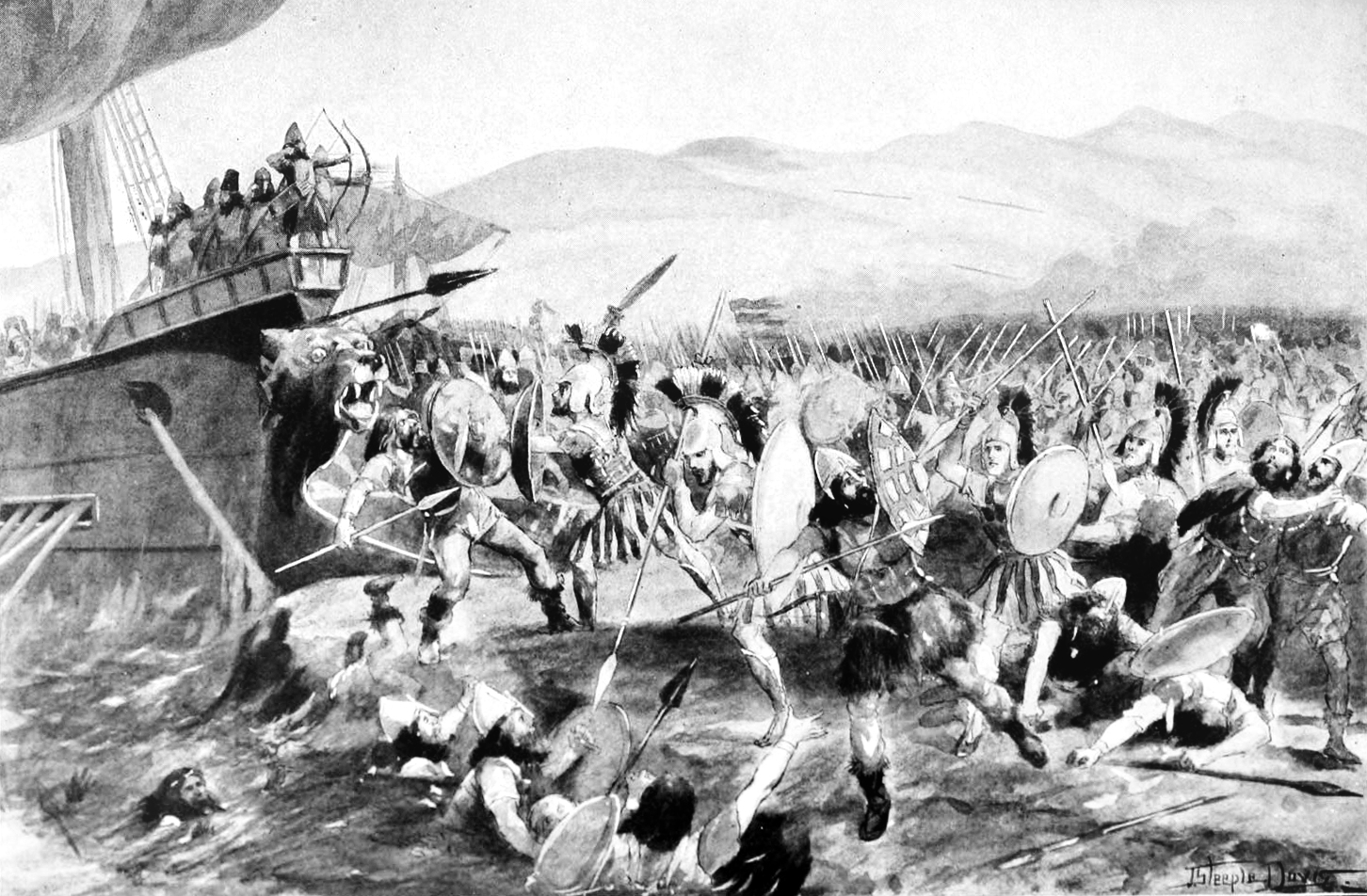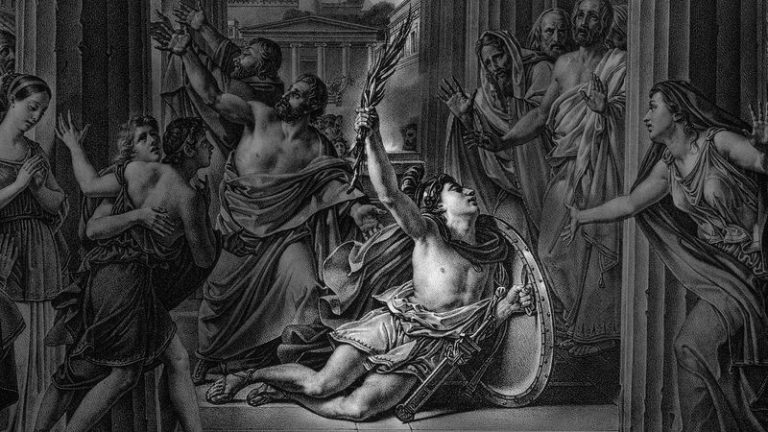Why is the Battle of Marathon Important
The Battle of Marathon is important because it marked a pivotal moment in the Greco-Persian Wars and demonstrated the strength of Greek military tactics. It also secured the independence of Athens, inspiring future victories in the war.
The Battle of Marathon, fought in 490 BC between the Greeks and the Persian Empire, was a significant event in ancient history. Despite being heavily outnumbered, the Greek forces, led by General Miltiades, successfully repelled the Persians in a decisive victory.
This triumph not only halted the Persian advance into Greece but also boosted Greek morale and laid the foundation for their eventual victory in the Greco-Persian Wars. The Battle of Marathon holds historical importance for its impact on Greek independence and military strategy, making it a crucial event in ancient warfare.

Credit: study.com
Origins Of The Battle
The Battle of Marathon holds significant importance in the history of ancient Greece. Understanding the origins of this battle provides insights into the complex historical context that led to this pivotal event. The battle took place in 490 BC, as the Greek city-states faced an imminent threat from the mighty Persian Empire.
Background Of Persian Invasion
The Persian Empire, led by King Darius I, sought to expand its dominion by conquering the Greek city-states and asserting control over the region. In 490 BC, the Persians launched a massive invasion of Greece, with the intent of subjugating the independent city-states and bringing them under the rule of the Persian Empire.
Greek City-state Preparation
As news of the imminent Persian invasion spread, the Greek city-states, including Athens and Sparta, realized the urgent need to consolidate their forces and strategize a defense against the formidable Persian army. The leaders of these city-states understood that the survival of Greek autonomy depended on their ability to unite and confront the impending threat collectively.

Credit: en.wikipedia.org
Key Events Of The Battle
The Battle of Marathon, fought in 490 BCE, was a pivotal event in ancient Greek history. It marked the first major conflict between the Persian Empire and the Greek city-states during the Persian invasion of Greece. The battle holds great significance due to the unexpected victory of the outnumbered Greeks against the mighty Persian forces. Let’s take a closer look at the key events that unfolded during this historic battle.
Persian Invasion Of Greece
The Persian invasion of Greece was initiated by Darius I, the King of Persia, who sought to expand his empire into Europe. In 490 BCE, a massive Persian force of approximately 25,000 soldiers landed on the shores of Marathon, a plain north of Athens. Their aim was to conquer and subjugate the Greek city-states under their rule.
The Greek city-states, aware of the impending threat, formed a united front to repel the Persian invaders. Despite their numerical disadvantage, the Greeks were determined to protect their freedom and way of life. The stage was set for a decisive conflict that would shape the course of history.
Greek Victory At Marathon
In a surprising turn of events, the outnumbered Greeks, led by the Athenian general Miltiades, emerged victorious at the Battle of Marathon. The Greeks employed ingenious tactics that enabled them to overcome the Persian forces. Instead of locking themselves within the walls of Athens, the Greeks positioned themselves strategically on the Marathon plain.
The Persians, underestimating the Greek army, launched a frontal assault. However, the Greek hoplites, heavily armored infantry soldiers, formed a strong phalanx formation that became their greatest asset. With their spears and shields, they managed to repel the Persian onslaught and inflict heavy casualties on the enemy.
The turning point came when the Greek forces, sensing the weakness in the Persian center, launched a decisive counterattack. Pushing forward with determination and an unwavering resolve, the Greeks managed to break through the Persian line and cause chaos among their ranks. The Persians, caught off guard and disoriented, were forced to retreat to their ships.
The Greek victory at Marathon was a significant achievement, not only militarily but also psychologically. It boosted the morale of the Greek city-states, proving that a united Greece could stand against the might of the Persian Empire. This triumph would later serve as an inspiration for future Greek victories during the Greco-Persian Wars.
Overall, the Battle of Marathon was a turning point in Greek history. It showcased the military prowess and determination of the Greek city-states, demonstrating their ability to repel foreign invaders. The bravery and strategic genius displayed by the Greeks at Marathon would inspire generations to come in their fight for freedom and independence.
Strategic Significance
The Battle of Marathon holds immense strategic significance in ancient history. Its impact on Persian expansion and the boost it provided to Greek confidence played a crucial role in shaping the course of events during the fifth century BCE.
Impact On Persian Expansion
The Battle of Marathon dealt a severe blow to Persian expansionist ambitions. It halted the momentum of the mighty Persian Empire, led by King Darius I, which had been steadily expanding its territories and influence across the Mediterranean. The resolute defense and victory of the outnumbered Athenians in Marathon not only saved their city-state but also sent a clear message to the Persians – their conquest of Greece would not come easily.
Boost To Greek Confidence
The triumph at Marathon instilled a newfound sense of confidence among the Greek city-states, particularly Athens. The Athenians’ display of courage, discipline, and strategic thinking against a formidable enemy filled them with pride and bolstered their belief in their own military prowess. This victory became a symbol of Greek resistance and unity, inspiring other city-states to join forces against the Persian threat.

Credit: study.com
Legacy And Commemoration
The Battle of Marathon holds significant historical value as it marked a pivotal moment in ancient Greek history, showcasing the strength and determination of the Athenian forces. The legacy and commemoration of this battle continue to inspire admiration for the courage and strategic brilliance displayed by the Greek soldiers.
Legacy and Commemoration The Battle of Marathon holds immense significance due to its legacy and commemoration. Let’s delve into the cultural impact in Greece and the modern-day remembrance of this pivotal event. Cultural Impact in Greece The Battle of Marathon had a profound impact on Greek culture. It signified the triumph of the Greeks over the Persians, becoming a symbol of patriotism and courage. This historic event is celebrated in literature, art, and music, immortalizing the bravery of the warriors who defended their land. Modern-Day Remembrance Even in modern times, the Battle of Marathon is remembered and honored. The marathon race, with a length of 26.2 miles, is a homage to the legendary run of a soldier who carried the news of the victory from Marathon to Athens. This tradition has spread worldwide, uniting people in the spirit of endurance and perseverance. In Greece, the annual Athens Classic Marathon is a poignant commemoration of this ancient battle. Thousands of runners from across the globe gather to participate, paying tribute to the legacy of the warriors who fought valiantly for their homeland. By understanding the cultural impact and modern-day remembrance of the Battle of Marathon, we can appreciate its enduring significance in shaping the values and traditions that resonate to this day.Historical Debate And Interpretations
The Battle of Marathon holds significant historical importance and has sparked various debates and interpretations over the years. Let’s delve into the controversies surrounding the numbers and the interpretation of Athenian strategy.
Controversies Surrounding Numbers
One of the key debates revolves around the actual number of soldiers involved in the Battle of Marathon.
Historians differ on the exact count, with estimates varying widely among sources.
- Some scholars suggest a smaller Athenian force, emphasizing their strategic prowess.
- Others argue for a larger Persian army, highlighting the magnitude of the Greek victory.
Interpretation Of Athenian Strategy
The tactics employed by the Athenians during the battle have also sparked diverse interpretations.
- Some view their swift attack as a bold and decisive move.
- Others emphasize the role of marathon runners in seeking reinforcements.
These varying perspectives contribute to a rich tapestry of historical analysis surrounding the Battle of Marathon.
Frequently Asked Questions Of Why Is The Battle Of Marathon Important
What Is The Significance Of The Marathon In Greek History?
The Marathon holds significance in Greek history as the site of the legendary battle against the Persians. This victory symbolizes the Greeks’ determination, bravery, and commitment to their freedom. The modern marathon race also honors the message of endurance and triumph.
How Was The Battle Of Marathon Remembered?
The Battle of Marathon was remembered through celebrations, monuments, and storytelling. It became a symbol of bravery and victory for the Greeks. The Athenians honored the fallen soldiers with a burial mound. The battle inspired future generations and left a lasting legacy.
What Played A Key Role In The Outcome Of The Battle Of Marathon?
The strategic Greek formation and the Persian underestimation of their opponent played key roles in the outcome of the Battle of Marathon.
Conclusion
The historic Battle of Marathon has left a lasting impact on the world. Its significance can be seen in shaping Western history and inspiring future generations. The courage and tactics displayed by the outnumbered Greeks have become a symbol of determination and victory.
Understanding this battle helps us appreciate the foundations of modern civilization.






